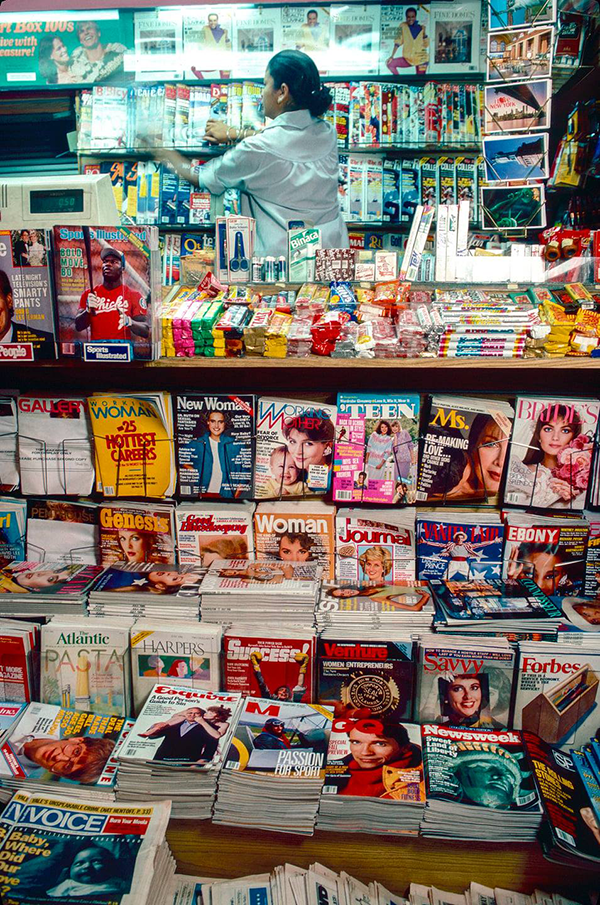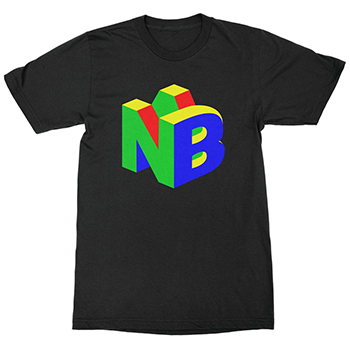Today I want to talk about the changing landscape of media, and how that effects the opportunities and potential for an author or creator sharing their work.
A photographer named John Abbott shared this image on social media the other day, a newsstand in New York City from July 1986:

Of course, magazines still exist today, but their footprint in the marketplace has been diminished. As I looked at this photo, I considered how much magazines were a part of my life when I was younger. They were a gateway to:
- Information & education. From how-to articles to interviews to analysis, magazines offered a deep dive into one topic that I couldn’t often find in newspapers, TV, or movies. Since it took so long to publish a book, magazines filled this critical gap of sharing information that was more of the moment.
- Access to a community and niche hobbies. Whether it was my interest in surfing, vintage VW cars, or British music, magazines gave me access to communities that were difficult to find where I lived.
- Magazines also provided a sense of identity, they made me feel like I belonged. I could read about others who cared about specific topics as much as I did. What you read — and were seen reading — was one of the ways I defined who I was.
- Seeking out magazines was a a hobby in itself. Spending time in those huge magazine stories in New York City, leafing through publications that were difficult to find, and sometimes very expensive. Magazines stands became a destination. A place to linger. To explore.
Magazines contained so much that was nearly impossible to find in any other kind of media. I would save issues for years, or cut out articles to keep for future reference. If I threw it out, I would lose access to that information forever. Or until I felt like scanning through microfiche at the library.
Someone commented on the photo above: “All those paid writers and illustrators…” with a crying emoji, bemoaning the loss of a well paying industry that employed so many people in stable jobs. Some of that work very much exists today, but it has changed.
Someone else commented: “It’s like everything else. When I was pregnant in 1987, I had to go to the public library to read about what stage my baby was in, plus other information for soon to be moms. Now it’s all on the internet, everything you need to know.”
In my essay last week, I mentioned the term the “creator economy.” What is that? It’s short for how much potential there is today for individual creators to earn revenue from what they create. Now, for many of you writers and artists out there, that phrase may give you whiplash. Perhaps you are thinking, “Dan, it’s harder than ever for a writer to earn a living by just writing. That newsstand photo alone speaks volumes to illustrate the demise of revenue streams for writers.”
I recognize that, and would never want to diminish how changes in the industry have disrupted tried and true business models for writers and creators. This is especially true when talking about being within a larger ecosystem system, such as a writer who works for a magazine, and can count on that magazine brand and parent company to develop an economy for writers.
But therein lies the revolution happening in the “creator economy.” One where individual creators can forge their own revenue streams that they can control.
What can this look like in real life?
- Someone who begins on one channel — Medium, TikTok, YouTube, Twitter, Instagram, podcasts, in-person events, a newsletter — often obsessively focused on one specific niche or sub-topic.
- As they grow, they treat their passion partly as a business. Even if they are big on one channel, they will expand to other channels so that they aren’t 100% reliant on one channel for their audience and revenue. So imagine a YouTuber who then also encourages people to follow them on TikTok or Instagram where they share unique content. Or an artist who have a big following on Instagram encouraging people to join her newsletter, with original content there. Or someone with a podcast who encourages people to support it by joining their Patreon community.
These creators are leveraging large corporations in this process, but they aren’t beholden to them. Or when they are, it is often more likely to the on the creators’ own terms. For instance, one podcaster just signed a $60 million dollar deal for her podcast to be exclusive to Spotify for a three year period. The creator still owns the podcast, so Spotify is essentially just getting an exclusive license for a limited period of time.
This is wildly different from the stories we heard from media in the past. When comic book creators weren’t able to own the characters they created, and may not have even gotten proper credit or compensation, while the larger corporate would profit from it for decades.
Why am I writing about this when I know many of my readers may simply want to know how to get more followers on social media or get more readers for their next book? Because the creator economy is you.
I study how people create and share online. Of course I focus on what writers are doing, but I also look way outside of that one area to focus on creators of all sorts. For instance, I watch a lot of video game streamers, even though I don’t really play video games that much. Why? Not only is the content itself intriguing, but there is a vibrant ecosystem that allows many of these creators to earn a good living in the process. It’s fascinating to discover how can a person sitting at home playing video games all day create multiple revenue streams, and establish a dedicated fanbase.
Why does this interest me? Because when I talk about the concept of Human-Centered Marketing, I am often focused on aspects of marketing that are timeless. On how we connect as people. On human psychology. On how identity plays into this. And when I study things that are way outside of the author world, I am seeing amazing case studies in what it means to communicate effectively, to engage fans deeply, and to find a sense of fulfillment and growth in what you create and share. Oh, and to also earn a living.
One of the most compelling things I watch is a YouTube channel called Colin and Samir. What are they doing? They are obsessed with helping there be more creators in the world. That can be a YouTube channel, an Instagram star, a Tik-Tok personality, a podcaster, and so much else. It can be anyone who is engaging fans, forging new ways to create a community, and earn revenue in the process.
To me, what resonates is the independence of creators. That someone — without a job or company behind them — can establish not only a way to create and share, but sustain themselves in the process.
Do you know what my 10 year old asked for recently? This t-shirt:

What is that t-shirt? Well, it’s a Nathaniel Bandy t-shirt of course? WHO?! He’s a guy who, at age 27 earns a full-time living making YouTube videos about Nintendo videogames. I had watched some of his videos before my son even mentioned him. I mean, this guy has nearly a million YouTube subscribers, more than 500 million video views. You can read about his entire history of how he grew his channel here.
Why does this t-shirt matter? Because my son is more interested in wearing this shirt from a person making videos about Nintendo, than one from Nintendo themselves. Nathaniel is someone who resonates with my son, whose personality and creations inspire him.
Perhaps you are a writer who got this far in this essay and is wondering, “Um, Dan. I just want to write. I just want to sit here in my home and write essays and books, and somehow get paid for it. Maybe a full-time income, or perhaps just part-time. Can’t someone else worry about the revenue streams for me? Shouldn’t a creator simply create?”
Yes, of course you can.
But this is why I shared the newsstand image at the top. When you offload the revenue model to someone else, you are tied to their system. Your revenue is going to rise and fall based on an economy that you may have little control over. If you are a freelance writer for large publications, you hope that your existing relationships and contracts keep you going.
But the modern creator economy is flipping that. These people are focusing on revenue and marketing not as a way of selling out. Instead, they are doing so as a way of sustaining their own ability to create. What’s more, they have much more freedom to create whatever they want. They aren’t limited to the trends that companies are dictating to them.
This is why I love doing the work I do. To help writers and creators:
- Learn to get clarity in what they create
- Identify ways to effectively to communicate it to their ideal audience
- Share it in a way that feels meaningful
- Understand who they hope to reach, and how to engage them
- Explore ways to turn that into a proper business with multiple revenue streams
The creator economy isn’t something happening to you. It is simply an option. You can participate if you like, or you can turn your back on it. We all have that freedom.
I spend so much time studying it is because when a writer or artist is empowered to be independent and thriving, it fills my heart with joy.
Thanks.
-Dan
